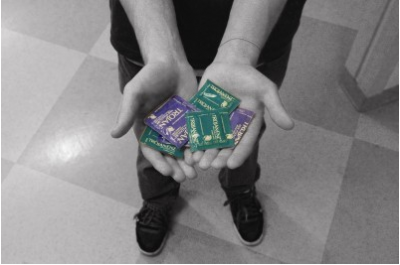
According to the Centers for Disease Control and Prevention (CDC), nearly half of high school students in the United States had sexual intercourse in 2009. Only 38.9 percent used a condom.
Says the CDC, “Each year, there are approximately 19 million new STD [sexually transmitted disease] infections, and almost half of them are among youth ages 15-24.”
In spite of these statistics, Staples does not dispense contraceptive devices to its student body.
“We do not provide contraceptives out of our office,” school nurse Elizabeth Russ said. “It’s not an actual policy that the district has; it’s just been historic. These types of policies are born out of community concern, and this has just never been a topic of conversation.”
While Principal John Dodig thinks students should have access to contraceptives through the school nurses’ office, he said that creating such a policy “would have to be a collective effort.”
Dr. Jonathan Sollinger ’86, a partner at Willows Pediatric Group in Westport and an American Academy of Pediatrics (AAP) fellow, believes that “restrictions and barriers to condom availability should be removed,” an opinion that is in accordance with AAP.
“Schools are appropriate sites for condom availability, but this should be just one part of a collaborative community process, including comprehensive sexuality education, parental involvement, counseling, and positive peer support,” Sollinger said. “The bottom line is that making condoms available to teens does not increase the rate of sexual activity, and their availability actually decreases rates of unintended pregnancy and STDs and HIV. This has been proven in study after study over the past 15 or so years.”
According to Grace Vetter, Coordinator of School Health Services for Norwalk Public Schools, the Norwalk district, like Westport, does not dispense contraceptives to students.
“My role is to support board policy,” Vetter said. “The Board of Education does not have a formal policy regarding distribution of contraceptives.”
Other public schools in Fairfield County do not have typical nurses’ offices like the ones found in Westport schools, but rather school-based health centers.
According to the Consent for Services form from the Bridgeport Health Department, “school-based health centers provide a variety of services, including…reproductive health services such as pregnancy testing and prevention counseling; testing and treatment of sexually transmitted diseases…”
Bridgeport school-based health centers were previously run by the city, but as of March 1, 2009, they are currently operated by two Bridgeport community health centers: Optimus Health Care and Southwest Community Health Center.
Kristin duBay-Horton, Director of Health and Social Services for the City of Bridgeport, affirms that the school-based health centers in Bridgeport do offer contraceptives to students, as long as the student’s parents have approved treatment in the school-based health center sites.
“Not offering contraception and not ensuring that [students] are utilizing condoms will affect their lives forever – due to unintended pregnancies and the long-term complications of STDs, which include infertility,” duBay-Horton said.
Although Staples does not dispense contraceptives to its student body, the Staples health education program aims to effectively teach students how to make safe, healthy decisions regarding the use of contraceptives, according to David Gusitsch, K-12 Physical Education and Health Curriculum Coordinator.
“We certainly have a comprehensive program which I think does a very good job of informing students on risks, as well as educating them in making the right decisions,” Gusitsch said. “Above all, we stress abstinence as being the only 100 percent effective method for preventing anything, whether it’s STDs, STIs [sexally transmitted infections], or pregnancy.”
Health teacher Kelly Garrity said that while she stresses and supports abstinence in her curriculum, she also believes that if students participate in some form of consensual sexual activity, they should be able to communicate with their partner about using contraceptive devices.
Encouraging students to make healthy decisions is also an important part of Staples’ Teen Awareness Group (TAG).
“We believe that educating students is the first step to prevention. We have recently edited our freshman health class presentation to focus on saying ‘no’ in a pressured situation,” TAG president Caela McCann ’11 said. “Having the confidence to say ‘no,’ whether that be ‘no’ to drugs, or ‘no’ to sex, is a step in educating.”
Outside of the school environment, teenagers can seek help and advice about contraception, as well as obtain contraceptive devices, at Planned Parenthood, a nonprofit organization that provides reproductive health and other health services.
“Planned Parenthood has been a valuable resource to many young people over the years, attempting to educate and counsel young people who utilize its services,” student outreach counselor Chris Lemone said.
Sollinger added, “[Planned Parenthood is] interested in promoting health and preventing disease, and I think they do a great job.”
A 2007 Associated Press-Ipsos poll showed that nearly 67 percent of American parents are in favor of public schools providing contraceptive devices to students.
“To be honest, I really don’t know how the community would react if the high school made condoms available to students. The Westport community is pretty liberal, but this in itself is really a personal matter,” Dodig said.
Nonetheless, Sollinger emphasizes that abstinence is the main solution.
“Kids should take their time with sex. Life is not one big episode of ‘American Pie,’ and usually the prize for the teen that has the most sex is gonorrhea, chlamydia, genital warts, or something worse,” Sollinger concluded.












































